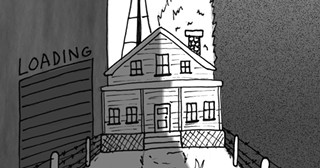A new report by the Canadian Agri-Food Policy Institute says the nation's agricultural sector is in serious decline and recommends we ramp up our food exports. We've dropped from third biggest food exporter to seventh, globally, with Brazil leapfrogging us and China and Argentina nipping our heals.
The facts are there, the analysis is reasonable, but the conclusion misses the big picture. Declining food exports is less frightening than the 50 percent increase in imports as oil becomes more inaccessible and spiking food prices feed southern riots.
Another recent report by Capital Economics predicts Canadian food inflation will soon reach five percent---it's at two percent now. We should worry less about our so-called competitiveness and more about feeding ourselves.
In Nova Scotia, where the vast majority of food is imported, that once-basic task of survival has become a meta-challenge encompassing low farm revenues, conglomeration of food retailers and farm suppliers, aging farmers, disappearing food processing infrastructure, heavy debt and poor eating habits. And as if self-sufficient eating wasn't tough enough, poor municipal decisions are feeding our already scarce farmland to greedy developers.
The February 1 decision by Kings County councillors was textbook. Despite overwhelming community opposition, council voted six to five to rezone more than 150 hectares of prime farmland for development.
"It's irreplaceable rural infrastructure," says Marilyn Cameron, a resident of Greenwich in Kings Country and a representative of No Farms No Food.
Cameron points to another recent report, this one by the Nova Scotia Land Review Committee, a government-appointed group of experts. They released Preservation of Agricultural Land in Nova Scotia in July 2010, which concluded that there are serious land shortages in the province.
"We have just enough land to feed ourselves if it was all cleared," Cameron says. "As is, there's a 53,000-hectare shortage and we can't afford to lose a single acre."
She adds that while young would-be farmers in Kings County are desperate for farmland there is no indication that development over existing farms is needed. "It is already virtually impossible to locate fertile, affordable land to farm near Greenwich. Two existing Greenwich farms wishing to continue farming have expressed deep concern that their businesses may be seriously hurt by this development."
Again, the Land Review Committee's report backs her up. Rick Williams, a farmer with 25 years' experience and a former Pictou County regional planner, chaired that committee.
"We found that an individual development may significantly impair the usability of surrounding land," Williams says.
Depending on the level of protection a municipality offers residents surrounding farmland from pesticides and machinery operations, 30 to 60 percent of the province's existing farm operations could be seriously hampered by even the smallest residential developments. At the very least, mixing dense development with farms invites conflict in those areas. Remaining farmers will likely be forced to alter their practices and the timing of farming activities to please new neighbours.
"Councillors made their decision despite there being thousands and thousands of available lots elsewhere in the county that are better suited for development without destroying farmland," Cameron notes. "What could drive them to side with a few developers when our door-to-door survey of 200 residents---including the landowners---shows 82 percent don't want those acres rezoned for development purposes?"
Cameron wants minister of agriculture John MacDonnell to intervene. MacDonnell has said that, unless his departmental staff find Kings County's zoning amendments in conflict with Nova Scotia's Statement of Provincial Interest on the Protection of Agricultural Land, he won't ever see them.
"The amendments will definitely trigger a ministerial review," Cameron says. To keep the pressure on, No Farms No Food is organizing a demonstration at the Halifax Farmer's Market on an upcoming Saturday, as well as an ongoing letter-writing campaign. In the meantime, despite the clear urgency of protecting land for food production, bureaucrats at the Department of Agriculture and Service Nova Scotia & Municipal Affairs have been reviewing the Land Review Committee's report since July.
The chair of that committee notes the urgency of moving on its many recommendations. "We don't have a lot of spare farmland kicking around," Williams says. "The sooner we get on it the better off we'll be."











